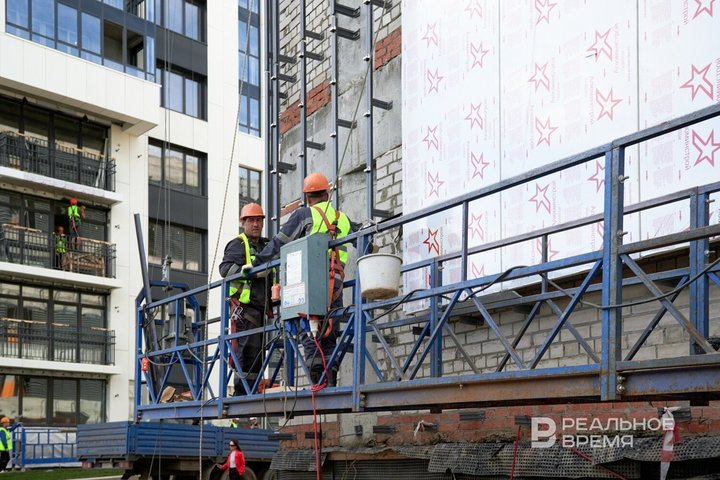How instalment plans saved Russia’s primary housing market from collapse
We’ll explain how developers’ property payment programmes work and why they displeased the Central Bank

According to experts’ estimates, more than half of apartments on the primary market today are sold on instalment plans, which greatly concerns the Central Bank. Due to the increased cost of mortgages, developers have no choice but to increase the share of instalment sales in their portfolios. The analytical service of Realnoe Vremya examined why the growing popularity of this tool displeases the Bank of Russia, what the average instalment period on the market in Tatarstan is today, and what risks buyers and sellers of property face.
More than half of all new buildings in Kazan are sold on instalment plans, says Anastasia Gizatova, head of Schastlivy Dom company. Looking at the figures across Russia, about one trillion roubles have not reached developers’ escrow accounts and remain tied up in instalment plans.

“A forced measure and a clear signal”

According to Galeev, the instalment mechanism is still imperfect but effective: “There is still a need to fine-tune it to make it balanced and meet the requirements of the modern real estate market and the expectations of citizens. As far as I know, such work is underway.”

The Central Bank cites three main risks against instalment plans: hidden growth in buyers’ debt burden, lack of transparency in property sale rules, and deterioration of project economics alongside credit risks for developers.
“We have already refuted the last argument, and as for the other two, there are also counterarguments,” said a Realnoe Vremya source. “Regarding the hidden growth in debt burden: instalment plans, on the contrary, are a tool to reduce credit load. Unlike a mortgage loan, where interest, fees, and debt obligations to the bank kick in immediately, instalments are fixed and predictable. The terms are known in advance and do not depend on fluctuations in the key interest rate. Moreover, many developers offer interest-free instalment plans, which makes them less risky for the buyer than a bank loan.”
Instalment plans do not appear on credit histories
“Instalment plans are a forced measure, both for developers and for buyers. High mortgage rates make purchasing housing unaffordable for most people, and under these conditions, instalments offer a chance to acquire one’s own apartment on more favourable terms. If subsidised mortgages begin to return, the share of instalments will decrease. Developers do not particularly benefit from having a large share of instalments in their portfolios, as escrow accounts are not replenished, which in turn increases the cost of construction loans,” the expert explains.
The Central Bank opposes instalment plans at least in part because they do not appear on credit histories: a person takes out an instalment plan, faces high monthly payments, but neither banks nor credit bureaus are aware of it. “And if the client takes on additional loans, the risk of bankruptcy is enormous,” he agrees.
According to him, instalment plans in housing sales have only recently become popular. Previously, they accounted for no more than 5% of total sales, and no one paid much attention to them. “Today, as I have already said, they make up about 25% just in our company. Therefore, the Central Bank is not particularly supportive of instalment plans and is even less interested in their widespread use,” comments Mikhail Kalashnikov.
A temporary tool or a necessary alternative to a mortgage?

“If there is a suitable property and the possibility to take out a long instalment plan, many strive to choose this option, even if the property will be sold on terms of price increase,” she says. “Firstly, the likelihood of transitioning to a mortgage at a reasonable rate is higher. Secondly, even if a client has the ability to pay for the property in full immediately, many prefer the maximum instalment period, as the remaining funds after the initial payment can work and generate income in other projects or deposits.”

Today, the average instalment period is one and a half years. There are longer-term offers, but these are rather “one-off” options.
For the developer, instalment plans also carry risks: they rely on project financing from the bank. “Simply put, construction is funded by borrowed money. The lending terms directly depend on how sales proceed and how escrow accounts are funded. In a situation where accounts are being funded but instalment agreements can be terminated at any moment, and the funds already paid under these agreements must be returned, the developer risks receiving the next construction tranche at a higher interest rate,” the expert explains.

Instalment plans are definitely a temporary tool that helps support sales in the current moment, she is confident. According to Guzel Shakhimardanova, once mortgages become more accessible, developers will stop using this tool. “Like any tool, it currently offers some clients the opportunity to lock in prices at this year’s level and avoid paying interest for a period of time, but, as with any tool, instalment plans must be used wisely,” she notes.
Moreover, developers have even begun competing on the size of the initial down payment: “It is decreasing, and monthly payments are also becoming fixed, while the principal balance can be paid at the end of the instalment period.” “Everything is done to ensure that the buyer chooses this particular apartment and makes their initial payment. Competition among developers is very high, and they truly offer attractive conditions for purchasing apartments,” he notes.
Many people buying apartments on instalment plans expect to switch to a mortgage with a reasonable rate within a year or a year and a half.
“The current situation is unfavourable for developers because escrow accounts are funded slowly, but there is nothing they can do about it today. The Central Bank of Russia is also aware of this situation and understands that people with unverified creditworthiness are buying apartments. Soon, information about such buyers will be sent to credit bureaus and will be taken into account when issuing mortgages,” he warns. “While it is currently possible to purchase several apartments on instalment plans, this option will no longer be available in the near future.”